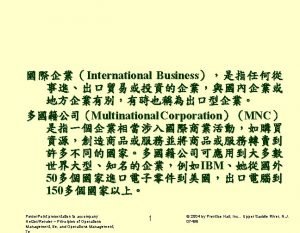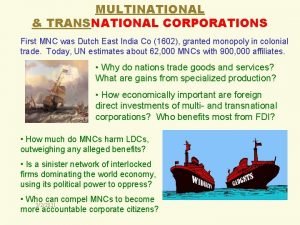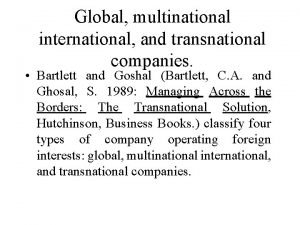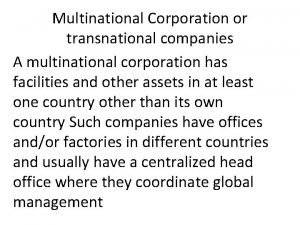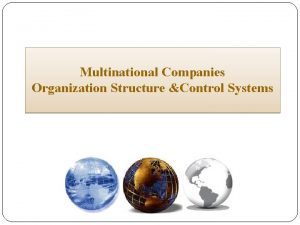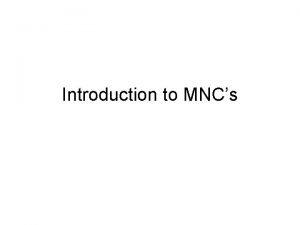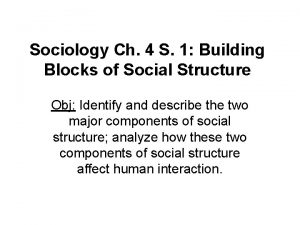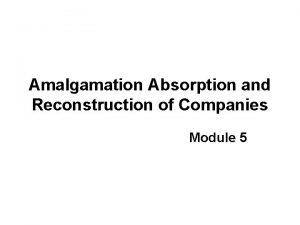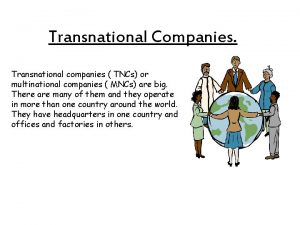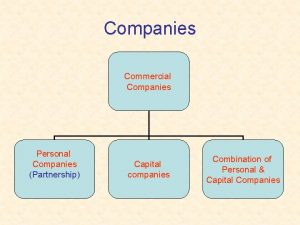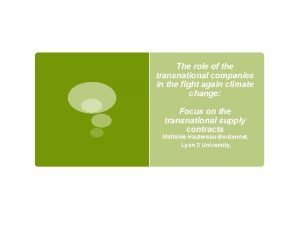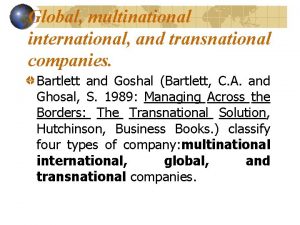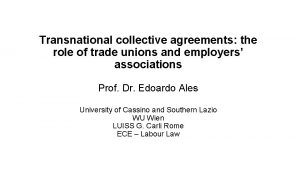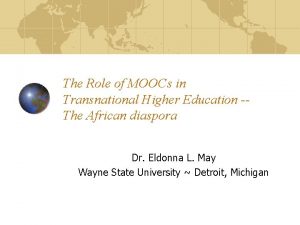The role of the transnational companies in the




































- Slides: 36

The role of the transnational companies in the fight again climate change: Focus on the transnational supply contracts Mathilde Hautereau-Boutonnet, Lyon 3 University,

Why this presentation ? § This presentation starts with the following observation: for a number of years, companies have publicly emphasised the fact that they intend to play a role in the fight against climate change. § The COP 21 in Paris has been the opportunity to show the place which could played by the business in the climate challenge. Various events organized by companies themselves took place alongside COP 21. (For instance, “Business Climate Days” which took place in Paris). § Above all, Paris agreement (12 dec. 2015) itself recognizes the “importance of the engagements of all levels of government and various actors” (Préamble). The decision of the Conference of the Parties goes even further. Article 134 invites “non-Party stakeholders” to “scale up their efforts and support actions to reduce emissions and/or to build resilience and decrease vulnerability to the adverse effects of climate change and demonstrate these efforts via the non-state actor zone for Climate Action platform” (NAZCA) § What is NAZCA? It is a website resulting from the “Lima-Paris Action Agenda” which took place during the COP 20. Via this website, an important number of Non-Parties (cities, companies, subnational, regions, investors and civil society organizations) reports their actions for the climate. We can find 2138 companies who have taken some commitments.

§ What are exactly all these committments? § We can assume a variety of voluntary instruments are behind them. For instance : codes of good conduct, system of standardisation (such as the ISO standard), § We would like to focus on one among them : the supply chain contract. These type of contracts are used by companies generally in a Northern country to source raw materials or finished products from distributors, producers or suppliers, and subcontractors, operating in Southern countries. § And in order to carry out their business in a sustainable manner, these companies insert or can already inserted into supply contracts, obligations enabling adaptation to the impacts of climate change, or their mitigation. § But why focus on this type of contract?

§ Because, the supply chain contract could be the « missing piece » in the climate change Law ( Katerina Peterkov Mitkidis, Using Private Contracts for Climate Change Mintigation, Groningen journal of International Law, vol. 2 (1) 2015), . § Indeed, we must point out that a large fraction of carbon emissions in developing countries is attributed to to the exportation of goods in developed countries. Different studies have shown that, in 2011, the CO 2 emissions embedded in products intended for exportation, accounted for 26% of the global CO 2 emissions. § About that, the international Law and National Law are not effeciency for catching the transnational relationships. Even if national gouvernments translate their international commitments into adequate policies, each state has his own legislation. § The result is the phenomen of the carbon leakage due to a difference between the national regulations: the unequal legislation can lead the companies to outsource their activities from countries with strict regulations about the emissions to countries with weaker legislations. § Of course, different solutions have been suggested to adress the carbon leakage problem: to reinforce the national legislation, create a carbon tax and encourage the companies to disclosure of emissions from all the supply chain. § Insert climate provisions in supply chain contracts could be one. Indeed, with their strong economic power, the transnational companies have the possibility to influence suppliers behaviour. Even if a supplier is regulated by a weak legislation, he should adopt more environmentaly friendly behaviour.

§ In sum, the supply chain contract can capture the transnational relationships and fills the gap of the international and national Laws. § But: why would from this concerning suppliers? § We transnational companies, beneffeting gap, voluntarily impose provisions the greenhouse emissions on their think that the role that companies intend to play must be taken seriously for different reasons:

§ On the one hand, climate risk now constitutes an economic risk for businesses. This is the case for transnational businesses that could see their supply sources weaken. A company located in a vulnerable State can be the supplier of a company located in a less vulnerable State, and climate change could strongly affect their trade relations. § On the other hand, climate risk is, not only a reputational risk, but also now a litigation risk: Today the litigations concern the States, but tomorrow, it will concern the companies. § Furthermore, companies are already invited to insert some environmental clauses under different private regulations belonging to Soft Law (more precisely the trend of the corporate social responsibility) with, sometimes, the support of Hard Law. § Above all, we think that the “contractual system”, and this is the goal of our presentation, is a very important factor in building a supply chain contract with a climate dimension.

But what is the contractual system?

§ This contractual system, as any “system”, combines various elements in interaction. § First, the contract itself as an individual norm, including contractual provisions/clauses created by the wills of the parties. § Second, the contractual order that governs the contract. This contractual order is made of various general purpose norms and it governs the contract, the content of the provisions for instance. Such as general norms that we can find in every National Laws: the pacta sunt servanda and the good faith. § The contract itself (individual norms) and the contractual order (general norms) are both in interaction and very complemetary: the contractual order can impose obligations even if the contractual parties haven’t included them.

§ Our opinion is that the climate potential of supply contract is the result of these two complementary elements : contractual provisions (clauses or terms) chosen by the parties and contractual order imposed on the parties). § Thus, these two elements of the contractual system deserve our attention. § They will be the two parts of our presentation with a last specification: in a transnational perspective, we will essentially refer to the UNIDROIT principles and to the usages and principles of the lex mercatoria, which are built b the merchants themselves. Because these transnational Laws are all inspired by the main Contract Nationals Laws.

Parts of the presentation § I – The climate potential of contractual provisions § II – The climate potential of contractual order

I – The climate potential of contractual provisions With regard to contractual provisions/clauses, the contractual freedom opens up infinities possibilities for dealing with the climate change. Indeed, two types of « climate provisions” could already lead companies to turn supply agreements into a new climate contractual norm : contractual provisions towards adaptation (A) to climate risk and those towards its mitigation (B). (It is then necessary to observe these two types of provision which have a very different goal: to adapt or to mitigate) A/ Contractual adaptation to climate risk B/ Contractual mitigation to climate risk)

A/ Adaptation § In this part, we would like to show companies, thanks to the contractual clauses included in transnational supply agreements, could lead with the impacts of climate change. §( It is not about avoiding the consequences of climate change but about finding contractual solution once the adverse impacts of climate change occur. ) § More specifically, we think there is a place for two types of adaptation: a classical adaptation (1) and a more original adaptation (2).

1) What about the classical adaptation? § The classical adaptation has the goal to protect the economic benefit of the contract § In light of the effects of climate change, two events should prompt transnational companies to include contractual provisions in supply agreements for preserving their business interests. § First, the inability for a company to provide the other one. § Concerning the UNIDROIT principles to which the parties could refer, such inability could lead to the termination of the contract if the inability is deemed to be a force majeure event. § It is therefore in the parties’ interests to determine, thanks to the provisions, the consequences attached to this situation in terms of contractual sanctions.

§ Second, transnational companies could be confronted to difficulties concerning the performance of the contract. Beside the material risk related to the potential increase of the cost of raw materials to be supplied, there is also a legal risk, related to changes in climate legislation, which could disturb contractual relations, in particular legislation implementing measures to fight against greenhouse gas emissions. § It could be difficult for one of the parties to perform its obligations if they become too onerous § This is the very classical problem of the place of the unforeseeable events in contract Law § For dealing with that, we know that domestic legislations, as well as the UNIDROIT principles, contemplate the revision of the contract if, in particular, the change of circumstances was unforeseeable at the time of the conclusion of the contract. § However, there could be a big problem: concerning scientific information, we can today considered that risks do exist and that they can no longer be ignored when the contract is entered into.

§ Hence, the parties need to insert « climate adaptation provisions » . § For instance: indexation provisions (and those anticipating a change in legislation, ) and above all, renegotiation clauses. § The place of the « hardship » clauses is indeed essential. § In addition, (to accompany this adaptation, ) the companies should include clauses facilitating amicable discussions (towards a renegotiation and to insert expert provisions to provide a better understanding on the state of scientific and economic knowledge). § Conclusion: (with using “climate provisions” included in their supply agreements, ) transnational companies can already preserve some economic interests and, finally, have a very important role to play in the “climate change adaptation” for themselves.

2) But what about a more original adaptation? - We think hence about the possibility to strengthen the economic benefit of the contract The idea seems incongruous but it should be discussed: - Climate risk could also result in the occurrence of events that benefit one of the parties, without however causing adverse effects on the other parties. - This occurs when, during the performance of the contract, national legislation supporting energy transition by giving financial benefits to an economic operator in this field. - As this distributor receives financial support thanks also to the operations of its supplier, the question is the following: could the producer not also profit from this green growth? Could the renegotiation also use to strengthen the economic benefit of the contract?

§ Admittedly, contract Law does not contemplate this situation. § However, contractual provisions could resolve this. § The parties could insert in the supply contract some “win-win” provisions. § (The contract could for example specify that, in the event that benefits are obtained thanks to the operations of other contractual parties which support the fight against greenhouse gas emissions, a renegotiation of the price could take place). § In the end, by strengthening the economic benefit of the contract, this type of clause would encourage the relevant party to increase its efforts in order to also profit from this green growth. § We conclude that, the adaptation (contemplated by supply agreements) could be very close to the mitigation of effects of climate change !

B/ Mitigation § Once again contractual freedom offers various possibilities for mitigating the effects of climate change and shows that the role of the transnational companies for fighting against climate change is becoming essential. § But, here, we would like to underline that the companies has a challenge to overcome: § Including these provisions both in the contractual relationship (1) and in the contractual space (2).

1) Climate mitigation provisions in the contractual relationship? § What about the possibility for the companies to include provisions for mitigating the climate change in the supply agreements? § A company can oblige their suppliers (or other economic partners) who are in vulnerable country to follow a conduct that supports the reduction of greenhouse gas emissions. (However, more specifically, certain provisions could be more appropriate and contribute to the effectiveness and efficiency of this goal). § Which kind of « climate mitigation provisions » ? § For instance: § A povision could impose to a party to report to the other party the greenhouse gas emissions produced by its operations regarding various private standards. § It could also specify that the parties will comply with the best domestic regulations for supporting the reduction of greenhouse gas. § (The parties could also include a provision requiring them to keep up with scientific information related to climate change). § Lastly, a provision could impose an obligation to renegotiate the contract for improving the mitigation of the effects of climate change regarding the evolution of the scientific knowledge.

§ However, (one difficulty must be pointed out: ) these provisions will be without effect if the global nature of climate risk is not taken into account. § (Indeed, climate change is not created by one single undertaking but by all companies, including abroad, that contribute to the production of a service or a product supplied). § Then, the mitigation must apply across the contractual space/chain within which climate risk circulates.

2) Climate mitigation provisions in the contractual space/chain? § Here as well, contractual freedom offers interesting ways to extend mitigation to the whole chain of climate risk. § At the very least, it should be possible to insert clauses providing that parties must impose climate provisions to their other contractual partners, (which they themselves have been required to use). § Most importantly, this requirement to ensure propagation of such provision could be established as a criteria to select economic partners at every level of the chain, (with an energy audit imposed to the relevant candidate). § Furthermore: It should be possible to ensure the effectiveness of this propagation of clauses through monitoring. § For instance, a principal company could reserve a right of control.

Conclusion/I - The review of climate contractual provisions shows that transnational companies can already take on a role as players in climate policy. - Thanks to the principle of contractual freedom and pacta sunt servanda, they could become the operators of a global legal regime, created by themselves. - But, the problem is that we are in the land of the voluntary and not of the compulsory. What is “possible for itself”” is not “compulsory for everybody”. - However, (beside the fact that for economic reasons, undertakings do have an interest in integrating climate risk in their contractual relations), the contractual order could tomorrow support the use of climate provisions (adaptation or mitigation). - (“Individual” contractual norms would here be supplemented by “general” norms within the contract Law giving them a climate dimension). - That’s why the climate potential of the contractual order, one second important element of the contractual system, deserves our attention in the second part.

II – The climate potential of the contractual order § What does this contractual order mean? § It is the one which governs contracts. It includes a wide variety of norms that stem from contract law but also from branches of other laws that can influence the conditions surrounding the conclusion or performance of a contract. § This definition is important because, in this second part, our goal is to demonstrate that the contractual order, Lex mercatoria/UNDIDROIT or National Laws could be widely mobilised for improving the possibility for transnational supply agreements to fight against the climate change. § More precisely, we think that, within this contractual order, the norms which impose some duties for contracting parties (A) but also for companies (B) could distil a climate substance into supply agreements.

A/ The duties of contracting parties § In order to understand what the “duties of contracting parties” are, a distinction must be made between the obligations expressed by the parties to the contract stemming from contractual provisions and obligations specified by contract law itself regardless of the will of the parties. § Obligations expressed in contractual provisions are chosen by the parties but those resulting from the duties of the contractual order are imposed to them. Thanks to the UNIDROIT/LEX/NATIONAL. § Then, certain climate duties could be imposed to the parties even if they haven’t include provisions in the transnational supply contracts. These duties seem to be a remedy to the inaction of the parties. § We would like to make a distinction between the possibility to extend the traditional duties (1) and the possibility more original to create new duties (2) concerning the climate change

1) To Extend traditional duties? § Recall: the contract Law brings together various traditional duties for the parties that we can find in different domestic Laws. One of the most famous is the good faith (bona fides) § More precisely, concerning the UNIDROIT principles, the good faith requirement can lead in various practical duties such as: the prohibition to act in an inconsistent manner to the detriment of the other party/ the obligation to renegotiate in the event of “hardship” but also/ to cooperate towards the performance of the contract. § Furthermore, as to the principles and usages of international trade, the legal doctrine of the lex mercatoria includes also the rules of the binding force of contracts and the good faith.

§ All these duties could play a role. § First, the good faith could support more concrete climate obligations, such as: - The obligation for the parties to disclose information on the consequences of their operations on global warming - To reduce their operations’ greenhouse gas emissions by following best available practices - To monitor the climate behaviour of subcontractors - To renegotiate the contract in light of the evolution of available scientific information for adaptation or mitigation purposes etc. § Second, the duty of contractual consistency could result in an obligation to behave consistently with certain commitments supporting climate. § More concretely, a supplier publicly exposing the fact that it is committed to adopt a conduct supporting the fight against global warming, could let the other party believe that it implements actual steps to that effect. Arbitrators or judges could impose climate obligations, in the name of what could be expected from these commitments.

2) To creat new original duties? § Contractual order could also welcomes new original duties and, among them, duties in favor to the fight against climate change. § Hence, two legal players have an important role for creating new contractual duties : - Judges or arbitrors, first - The practice, second

§ Concerning the judge and the arbitror, according to the UNIDROIT principles, the contract requires compliance with express obligations but also “implied” obligations. § (These “implied” obligations stem notably from the nature and the purpose of the contract). § Moreover, pursuant to the lex mercatoria and even in the absence of express provisions, arbitrators can apply principles and usages to the dispute. § Then, judges and arbitrors could use their power to find and impose a number of « climate obligations » which could supplemented the “climate provisions”.

§ Concerning the second legal player, we have to remind that, according to the UNIDROIT Principles, the parties are bound by any usage. § The usages of the practice are also recognized as a general and classical norm of the Lex Mercatoria. § Thus, we can imagine that, in the future, to carry out “clean” operations that are compatible with the aim of reducing greenhouse gas emissions constitutes a usage of international trade and involves compliance with a number of obligations. Of course, it will depend on of certain conditions. § In particular, according to the criteria set out in the UNIDROIT principles, a usage has to be “widely known and regularly applied by the parties to contracts in the relevant trade branch”. § (Thus, in the future, to find out an usage, we should closely monitor the importance of climate provisions in the practice of the transnational supply agreement, but also in contractual documents or general terms of purchase or guides and lists of clauses setting them out. § The phenomenon of companies’ social responsibility could help us because it drives transnational companies to publicly expose their commitments in particular to the environment).

§ (To conclude concerning the contractual duties, we think that, they have a potential for serving the climate cause, even if it remains hence a prospective view. § However, our opinion is this is believable because these contracting parties are also companies. § Indeed, we would like now to show that this status could incidentally have climate consequences on the content of the contract Law or the supply agreements themselves).

B/ The duties of companies § The contractual order also includes norms that, without strictly belonging to contract law, have an impact on the substance of contracts. This is currently the case of company Law, human rights Law and environmental Law which renew the environmental public order. § (We would like to demonstrate that these norms, which belongs to hard or soft Laws, bring together duties which could lead companies to insert climat provisions in their supply agreements). § More specifically, concerning these companies duties, the soft Law (2) rather the hard Law (1) could ultimately play a role.

1) The « hard » duties § Recall: while in France, the Environmental charter, which has a constitutional value, recognises environmental rights, the European court of human rights protects the right to the environment by linking it to the right to life (article 2 of the ECHR) and the respect of private and family life (article 8). § Thus, judges or arbitrators could be sensitive to the respect of these environmental human rights in contracts, in particular in the context of the review of the validity of a contract (article 3. 3. 1 of the UNIDROIT principles). § (Then, admitting that climate can fall within the scope of the protection of the human right to the environment, judges could be called upon, in the future, to check that the content of a contract does not harm climate).

§ Above all, concretely, it would indeed be the case if, in the future, the various national legislators imposed a “duty of care” to transnational companies which have the power to monitor the environmental conduct of their trade partners. § This duty of care has been currently recognized in French Law. But it is not the case in most of others national Laws. § That’s’s why, today, in a global view, this type of provisions seems be the result of the soft Law.

2) The « soft Law » duties § The contractualisation (implementation in contract) of soft duties is well known : under the normative trend of companies’ social responsibility, companies emphasise publicly that they follow a code of good conduct, adhere to a system of standardisation or international frames of reference, such as, the Global Compact or the more specific Caring for climate. § A number of these norms encourages companies to promote the respect for certain human rights and environmental principles within their “sphere of influence”. (For instance, the principle 10 of the OECD provides that businesses should “encourage, as much as possible, their trade partners, including their suppliers and their subcontractors, to apply principles of conduct of business conform to the Guiding Principles”). § As a result, the companies has been encouraged to insert environmental provision, such as climate provisions, in their supply agreements. § Admittedly, as yet, nothing tells us that this contractualisation is effective. However, companies are indeed encouraged to publicly disclose them. It is here the pressure of the “comply or explain” imposed by different instruments (such as carbon discloser project /the Global Compact or some domestic Laws). § (Then we can notice that, concerning the duties of the companies, that Soft Law is here supplemented by hard Law for improving the efficency of the provisions).

Final Conclusion § Thus, at the end of our presentation, we think that contractual provisions and contractual order have a climate potential. The road is still long and will depend mostly on the pressure exercised by economic and social forces on the business world and the efficiency of the contractual system. § It shows us a densification of climate la: , Law created by States on international and national levels and Law created by private actors, businesses. Hard and Soft Law also. § (Thus a new vision of climate law emerges with, ultimately, an invitation for thinking about the place of the Lex Mercatoria in the climate change Law).

Merci beaucoup pour votre attention!
 Transnational strategy vs global strategy
Transnational strategy vs global strategy Objectives of ihrm
Objectives of ihrm Multidomestic marketing strategy
Multidomestic marketing strategy A firm pursuing a transnational strategy would believe that
A firm pursuing a transnational strategy would believe that First mnc in world
First mnc in world Multidomestic strategy
Multidomestic strategy Transnational crime examples
Transnational crime examples Multinational vs transnational corporations
Multinational vs transnational corporations Disney swot analysis
Disney swot analysis Transnational vs multinational
Transnational vs multinational Domestic structure plus foreign subsidiary
Domestic structure plus foreign subsidiary Transnational crime and the developing world
Transnational crime and the developing world Marketing chapter 5
Marketing chapter 5 Introduction of mnc
Introduction of mnc A transnational corporate-level strategy seeks to achieve
A transnational corporate-level strategy seeks to achieve Azure web role vs worker role
Azure web role vs worker role Ambiguitätstoleranz krappmann
Ambiguitätstoleranz krappmann Statuses and their related roles determine the structure
Statuses and their related roles determine the structure Strategic intelligence companies
Strategic intelligence companies Melaleuca vs amway
Melaleuca vs amway Axon outsourcing
Axon outsourcing Small multinational companies
Small multinational companies Amalgamation in the nature of purchase
Amalgamation in the nature of purchase Waste collection lindsay
Waste collection lindsay Disadvantages of multinational companies
Disadvantages of multinational companies Three companies in business chapter 2
Three companies in business chapter 2 North carolina biotech companies
North carolina biotech companies Wck companies house
Wck companies house Intercompany integration solution for sap business one
Intercompany integration solution for sap business one Marketing environment introduction
Marketing environment introduction Meaning of mnc
Meaning of mnc Government relations companies
Government relations companies Why do companies advertise
Why do companies advertise Companies act no 7 of 2007
Companies act no 7 of 2007 Grenada trash service
Grenada trash service Unit 2 companies
Unit 2 companies Top semiconductor ip companies
Top semiconductor ip companies


